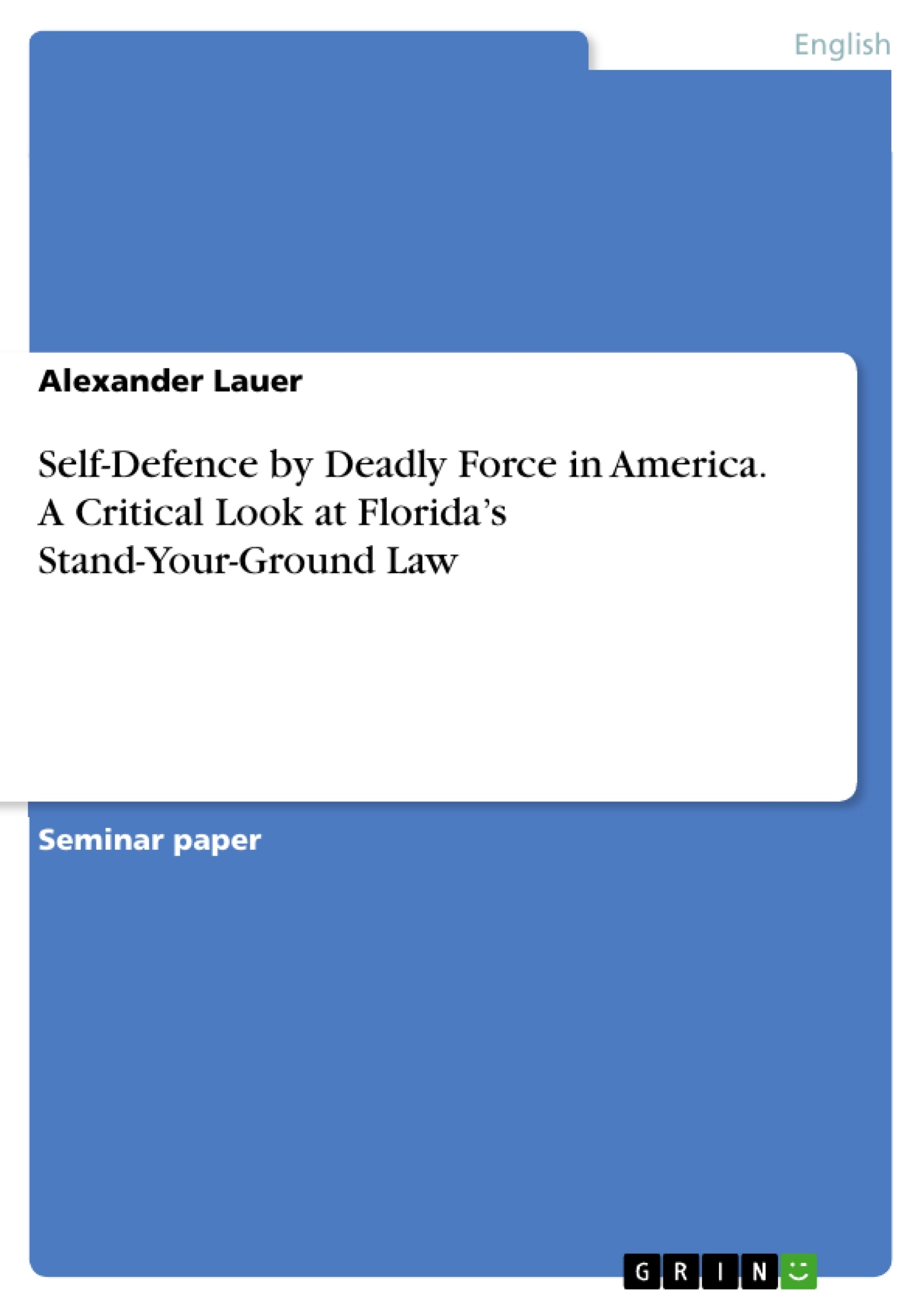The debate about “stand your ground” seems to rest on simplification and emotion. Suffice it to say that a former president of the National Rifle Association (NRA), Marion P. Hammer, called opponents of Florida’s stand-your-ground law “Chicken Littles”, and that Martin Dyckman of the St. Petersburg Times advised tourists to avoid Florida because “Lebanon might be safer”.
This paper wants to establish a clear view on some aspects of the past and present of self-defence by deadly force, which is the most controversial case of Florida’s stand-your-ground law. The paper hence aims at two things: shortly explaining the historical roots of the law and then taking a critical look at the law itself in order to determine whether it shows any serious flaws that would justify changing it.
After a short account of the theory of self-defence in general, the focus in the first part will be on the history of self-defence by deadly force in English and American law, whose keywords “duty to retreat” and “castle doctrine” are pivotal for understanding today’s law. In the second part, the specific situation of Florida will be addressed. Firstly, by giving a brief overview of how the duty to retreat and the castle doctrine were interpreted in Florida until the new stand-your-ground law took effect in 2005, and secondly, by expounding the content of the law and the arguments that have been put forward in favour of it. The last part will then deal with the arguments speaking against it and produce some of the points it has been most criticised for in the literature.
Inhaltsverzeichnis (Table of Contents)
- Introduction
- Theoretical and Historical Foundations of Self-Defence by Deadly Force
- The Theory of Self-Defence
- Self-Defence by Deadly Force in Medieval English Law
- The Duty to Retreat and the Castle Doctrine in American Law
- Florida's Stand-Your-Ground Law
- The Situation Before October 2005
- The New Law Since October 2005
- The Content of the Law
- The Grounds and Arguments for the Law
- The Downsides of Florida's Stand-Your-Ground Law
- The Superfluousness and Unproportionality of the New Law
- The Questionable Immunity from Criminal Prosecution and Civil Action
- The Problem of the Irrebuttable Presumption
- Conclusion
Zielsetzung und Themenschwerpunkte (Objectives and Key Themes)
This paper aims to analyze Florida's "stand your ground" law by exploring its historical context and examining its potential flaws. It seeks to determine whether the law's provisions justify changing it.
- Historical Roots of Self-Defence by Deadly Force
- Duty to Retreat and the Castle Doctrine in English and American Law
- Florida's Stand-Your-Ground Law and its Implementation
- Arguments for and Against the Stand-Your-Ground Law
- Potential Downsides of the Stand-Your-Ground Law
Zusammenfassung der Kapitel (Chapter Summaries)
- Introduction: The paper introduces Florida's "stand your ground" law and its controversial nature. It highlights the importance of understanding its historical roots and its potential shortcomings.
- Theoretical and Historical Foundations of Self-Defence by Deadly Force: This chapter discusses the theory of self-defence in American law and traces its historical development in English law. It explores the concepts of "duty to retreat" and the "castle doctrine" as key elements in understanding self-defence by deadly force.
- Florida's Stand-Your-Ground Law: This chapter provides a detailed account of the "stand your ground" law in Florida. It explains the legal changes that occurred in 2005 and outlines the arguments used to justify the law.
- The Downsides of Florida's Stand-Your-Ground Law: This chapter examines the criticisms leveled at the "stand your ground" law, exploring issues such as its potential for abuse, its impact on criminal prosecution and civil actions, and the challenges posed by its irrebuttable presumption.
Schlüsselwörter (Keywords)
This paper explores the concepts of self-defence, deadly force, duty to retreat, castle doctrine, and stand your ground. It examines Florida's "stand your ground" law and its potential consequences, including criminal prosecution, civil actions, and the irrebuttable presumption of self-defence.
Frequently Asked Questions
What is Florida's "Stand Your Ground" law?
It is a law enacted in 2005 that allows individuals to use deadly force in self-defence without a duty to retreat, if they reasonably believe it is necessary to prevent death or great bodily harm.
What is the "Castle Doctrine"?
The Castle Doctrine is a legal principle that allows a person to use force to protect themselves in their home (their "castle") without needing to retreat first.
What does "duty to retreat" mean?
It is the requirement in some jurisdictions to attempt to escape from a threatening situation before resorting to deadly force. Florida's 2005 law largely removed this duty.
Why is the Stand-Your-Ground law controversial?
Critics argue it is superfluous, leads to unproportional use of force, and provides questionable immunity from criminal and civil prosecution.
What is the "irrebuttable presumption" in this context?
It refers to the legal assumption that a person acted in self-defence under certain conditions, which can be very difficult for the prosecution to challenge.
- Arbeit zitieren
- B. A. Alexander Lauer (Autor:in), 2015, Self-Defence by Deadly Force in America. A Critical Look at Florida’s Stand-Your-Ground Law, München, GRIN Verlag, https://www.grin.com/document/489856



